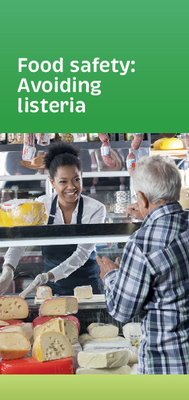Food Safety: Avoiding Listeria - HE9007

Listeria information for vulnerable people, including people who are pregnant. Listeria bacteria cause the infection listeriosis, but this can be prevented by safe food preparation, handling and storage practices.
The full resource:
What is listeria?
Listeria is a common bacterium, which can cause a potentially serious illness called listeriosis.
How do people get listeriosis?
Listeriosis is a food-borne infection that results from eating contaminated food. Chilled or prepared ready-to-eat products and foods, processed meats, soft cheese, and raw food are often linked to outbreaks of listeria.
Who is at serious risk of listeriosis?
In healthy adults and children listeria usually causes few or no symptoms, but the following people are at more risk of serious disease:
- pregnant women and their unborn babies
- newborn babies
- people with weakened immune systems1
- frail older people2.
If you are not sure about your risk of being infected, talk to your doctor.
- Including cancer patients, diabetics, people taking immunosuppressive or cytotoxic treatment, people with alcoholism or liver or kidney disease.
- While this group is not strictly defined, a frail older person can be considered as a person over 65 who is in a vulnerable state of health that puts them at greater risk of further deterioration, ill-health or illness. Further information about frailty in older people is available from Food and Nutrition Guidelines for Healthy Older People: A background paper | Ministry of Health NZ
What are the symptoms?
After being infected with listeria it takes between a few days and a few weeks for symptoms to develop. You may have no symptoms at all or you may become ill with:
- mild fever
- muscle aches
- nausea or vomiting
- diarrhoea
- headache.
In a small number of cases these symptoms can progress to more severe forms of the illness, such as meningitis and blood poisoning.
Listeriosis can be very serious for pregnant women. It can cause miscarriage, premature labour, or stillbirth and can cause severe infection in the newborn baby. If you think you might have listeriosis, see your doctor immediately.
How can listeriosis be prevented?
The risk of serious illness from listeria infection can be reduced by safe food handling practices. Listeria will grow on food even if it’s in the fridge and can withstand freezing.
However, some foods are more likely to become contaminated so people who are at risk of severe disease should not eat them. Some of the main ones are listed below, but for a comprehensive list of foods check out: Food and pregnancy | NZ Government (mpi.govt.nz)
Safety with food
You can keep food safe by:
- following good food hygiene practices, such as washing and drying hands thoroughly before and after handling and preparing food
- eating freshly-cooked or freshly-prepared foods
- washing raw fruit and vegetables very well before eating
- cooking food thoroughly to kill any listeria bacteria
- refrigerating leftovers immediately (cool hot foods for 30 minutes before refrigerating) and using them within two days. (Leftovers should be reheated to steaming hot – at least 75° C before eating.)
Unsafe foods for people at risk:
- uncooked, smoked or ready-to-eat fish or seafood, including oysters, smoked ready-to-eat fish, sashimi or sushi*
- paté, hummus-based dips and spreads
- ham and all other chilled pre-cooked meat products including chicken, and fermented or dried sausages such as salami*
- pre-prepared or stored salads (including fruit salads) and coleslaws
- raw (unpasteurised) milk and any food that contains unpasteurised milk*
- soft-serve ice creams
- soft, semi-soft, or surface-ripened soft cheese (such as brie, camembert, feta, ricotta, and roquefort)*.
* Note that these foods are safe to eat if heated thoroughly to steaming hot (at least 75° C).
For more detailed information on which foods are safe to eat see the following links.
- During pregnancy: Food and pregnancy | NZ Government (mpi.govt.nz)
- For people with low immunity: Food for people with low immunity | NZ Government (mpi.govt.nz)
Safer foods for people at risk:
- freshly-cooked foods
- pasteurised dairy foods, including:
- milk, UHT milk, yoghurt
- hard cheese (such as cheddar, colby, and edam)
- processed cheese, cheese spread, cottage cheese and cream cheese (eat these cheeses within two days of opening the pack)
- purchase all cheese in sealed packs, in small quantities, and use by the use-by date.
- freshly-washed vegetables and fruit
- freshly-prepared salads
- bread and baked foods without cream or custard
- dried food
- cereals
- beverages.
More information
Your local public health service can give you more information on food preparation, storage, and safety. You can also talk to your doctor or nurse or contact the Ministry for Primary Industries – food safety group, Food safety at home | NZ Government (mpi.govt.nz) or Freephone 0800 008 333